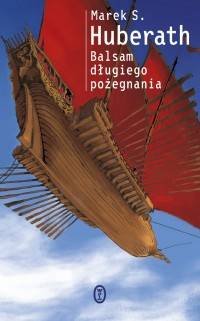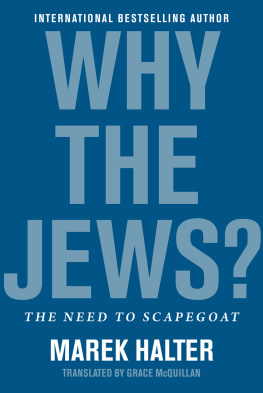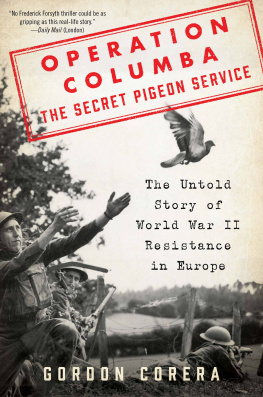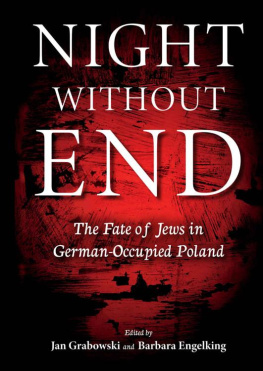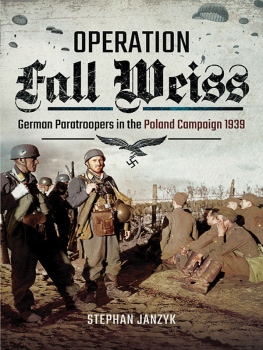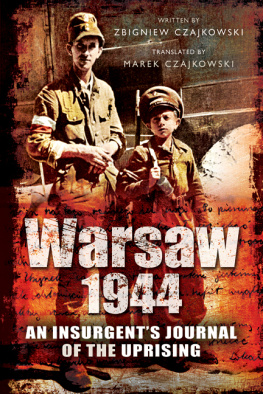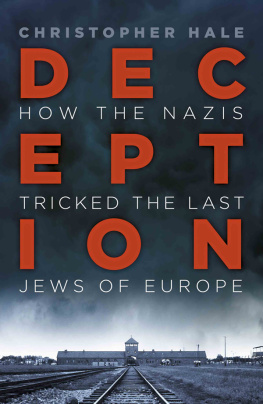Parachuting into Poland, 1944
Memoir of a Secret Mission with Jzef Retinger
Marek Celt
Edited and annotated by Wojciech Frazik
Translated by Jan Chciuk-Celt

McFarland & Company, Inc., Publishers
Jefferson, North Carolina, and London
LIBRARY OF CONGRESS CATALOGUING DATA ARE AVAILABLE
BRITISH LIBRARY CATALOGUING DATA ARE AVAILABLE
e-ISBN: 978-1-4766-0338-4
2013 Ewa Chciuk-Celt. All rights reserved
No part of this book may be reproduced or transmitted in any form or by any means, electronic or mechanical, including photocopying or recording, or by any information storage and retrieval system, without permission in writing from the publisher.
On the cover: Military canopy parachutes and wheat field (iStockhoto/Thinkstock); night sky (Zoonar/ThinkStock)
McFarland & Company, Inc., Publishers
Box 611, Jefferson, North Carolina 28640
www.mcfarlandpub.com
Acknowledgments
Without the dedicated cooperation of Polish historian Dr. Wojciech Frazik, this book would still be an unfinished manuscript in my late fathers desk, but he agreed to edit what my father had left behind into a finished book, which was published in Poland by LTW in 2006. Furthermore, Dr. Fraziks annotations added an invaluable measure of historical depth. I wish to express my heartfelt gratitude to him for getting involved.
Once I had the translation completewith enormous support from my familyit was Angie Jabine who very generously shared her editorial advice with me, and she, too, is owed a debt of gratitude.
Id like to acknowledge the invaluable assistance of Karolina Sikora of the MHPRL (Museum of the History of the Polish Peoples Movement) in Warsaw, where she curated an exhibit dedicated to the memory of Tadeusz Chciuk-Celt, and of Marek Jastrzbski at LTW, the original Polish publisher. Dzikuj! Also, Im grateful to the Rev. Dr. Elizabeth DH Carmichael of St. Johns College, Oxford, for her gracious cooperation regarding the excerpt from By Parachute to Warsaw, and to Luke Celt, my brother, for his help with indexing.
Jan Chciuk-Celt
Table of Contents
Introduction
by Jan Chciuk-Celt
This book is the fourth and final volume of my late fathers memoirs concerning his activities during the Second World War, written in Polish under the pen name Marek Celt. It deals with his second parachute mission into occupied Poland, Operation Salamander, which dropped him and Dr. Jzef Retinger near Warsaw on April 4, 1944, and the subsequent events, culminating in the mission to pick them both up again on July 26, 1944, which was called Operation Wildhorn III. The book was almost, but not quite, finished when my father died in 2001, and his manuscript was edited into its final form by the eminent Polish historian, Dr. Wojciech Frazik. The original Polish edition (Z Retingerem do Warszawy i z powrotemRaport z Podziemia 1944) has done quite well in Poland. I got involved by translating the book into English, principally because I felt that it told a thrilling story, taken right from the pages of historya story that deserved a wider reading audience, i.e., the English-speaking world. Beyond that, this book constitutes a significant addition to the rather meager body of available written material about Dr. Retinger, and I felt that it was important that it should be translated. I was also able to include some source material that has never been published before, namely, a few frames of the microfilmed information my father brought back from Poland to the authorities in London. Ive tried to keep my translation as straightforward as possible, adhering closely to exactly what was written, and taking only minimal liberties with some sentences.
At the time of this mission, my father was a 27-year-old Polish junior officer (Second Lieutenant), doing commando assignments which involved parachuting by night into German-occupied Poland. The men who went on these missions were an elite group of special forces called the Cichociemni, literally the Silent Dark Ones. I call them Silent Shadows in this book. Theyve become something of a heroic legend in Polish war lore, with their adventures adapted into made-for-TV movies, miniseries, documentaries and the like. These parachute missions were vital to the Polish Government-in-Exile, and the daring men who went on them were a little larger than life in the eyes of the Polish people. Dozens of these Silent Shadow missions were flown, out of England at first and eventually out of southern Italy. The planes, training and equipment were provided by the British S.O.E., or Special Operations Executive, while the Polish side provided well-trained and highly motivated special forces, and coordinated events on the ground. The risk factor was extremely high; several planes were shot down on the way to Poland, and the Cichociemni lost a lot of fine men in action on the ground. My father was in fact the only man to survive two of these Silent Shadow parachute missions, complete his assignment and return to base.
What Was Operation Salamander?
This operation was unique in the annals of the Cichociemni missions in several ways. To begin with, the entire human payload of Operation Salamander consisted of two men, both of them on a strictly civilian political mission, where more typically a team of about six mostly military men, dressed as ordinary civilians, would be dropped into occupied Poland. (The mission did also deliver eighteen containers of supplies and military materiel.) Even though my father held the rank of Second Lieutenant, he was sent on this mission in mufti as an emissary of the Polish Interior Ministry. The man he was accompanying was a 56-year-old political advisor named Dr. Jzef H. Retinger, who had never in his life strapped on a parachute beforenot even in training.
The operational mission was purely political and intelligence-relatedaside from the pre-arranged air drop of equipment and supplies, receipt of which was handled very surely and swiftly by the forces on the ground. Acting as a personal emissary of the Polish Prime Minister, Stanisaw Mikoajczyk, my father was assigned the urgent task of explaining to the key political figures in Poland that the Allies, following through on the promises they had made to Soviet leader Joseph Stalin at the Teheran Conference, were now fully backing the Soviet Union and its Red Army in their fight against the Germans, and that consequently Poland would soon have to accept Russian soldiers on Polish soil as they pushed the Germans backdetestable as the prospect might seem. It is worth mentioning that Stalin, who was already preparing a Communist cadre for the takeover of power in Poland, had broken off diplomatic relations with the Polish Government-in-Exile several months earlier, under the absurd pretext that the Poles were cooperating with Hitler. My father and Dr. Retinger were now going to have to explain to the Polish underground leaders that resisting the Russians would be futile, a waste of time and blood, and an irritant to our only allies, the Americans and British. Exhausted though they were, many leaders in Poland wished to fight the Soviet Red Army at any cost, even though they were completely unprepared to take them on. Driven by patriotism, they simply wanted no part of what they saw as caving in to the Russians, or indeed a treasonous betrayal of Poland. The Government-in-Exile, located in London, had to explain that from their point of view, working with our allies in the midst of a much larger war, we simply had no choice but to accept the inevitable. The patience of the British was already wearing thin as they waited for the Polish side to get with the program. Foreign Office Undersecretary of State Sir Anthony Cadogan had already expressed his frustration to Retinger personally, telling him, The Poles are incorrigible idiots, and Poland will drown. We Poles simply had to come to terms with our role as expendable pawns in a larger game, and the government in London had some explaining to do to the people in Poland. Toward this end, my father was intensively briefed for several weeks on all the personalities hed be meeting with, the various political groupings and their viewpoints, and the geopolitical background against which all of this was playing out. He was specifically trained to be a human gramophone, memorizing large amounts of information and classified intelligence that he was to replay verbatim when he got to Poland, then switching to record mode and committing to memory the details of certain conversations he was to take part in, which were held at the highest levels of the Polish underground. He wasnt supposed to keep anything at all in writing, in case he got caught by the Germans, but he did in fact keep a tiny coded notebook in one of his socks. Upon his return to London, these conversations he had recorded were then transcribed as faithfully as possible and included in his report to Prime Minister Mikoajczyk, who had personally sent him on Operation Salamander.



